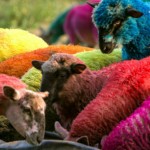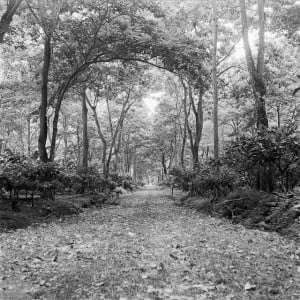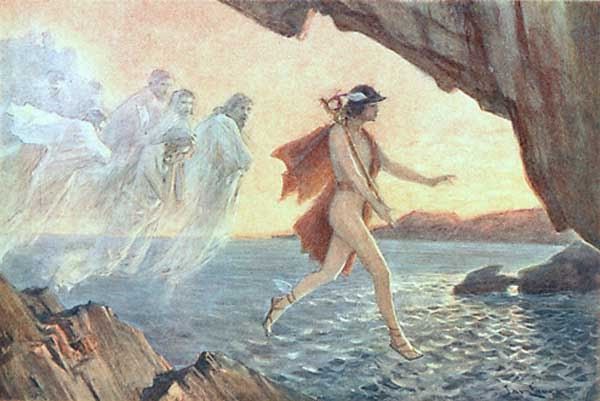Last fall, my friend Anna’s bees died.
They had lived in a white hive at the back of her yard in one of St. Louis’s grander neighborhoods. Herbs and flowers were planted around the border of the lawn for them. They were not carted around from one monocultured crop to another, earning their living and their keeper’s by pollinating fields and groves.
These were urban bees. They were loved and well cared for. They were not exposed to agricultural chemicals and the neonicitinoids and fungicides currently blamed for much colony collapse. They were exposed to the same chemicals all of us who live in cities must live with—lawn fertilizers and pesticides, auto emissions, particulates. And they died of it.
As we prepare to celebrate the first of our three harvest festivals, let’s not forget that so many of the foods we eat in celebration would not exist without pollinators. The most important of these are bees. And the bees are dying.
Since 2006, honeybees have been dying in large numbers, whole colonies of them, about 30 percent of all the kept bees in the U.S. each year. It’s reached the point that 90 percent of all the managed honeybees in the U.S. are now needed to pollinate the almond crop in California; almonds are completely dependent upon honeybees.
The causes of this colony collapse disorder apparently are many. There’s the stress on bees from being driven from one field to another. There’s the many pesticides and fungicides they are exposed to. There’s the dearth of water and food sources from increasingly less diverse landscapes.
A recent University of Maryland and USDA joint study looked at the pollen honey bees brought back after pollinating a diverse group of crops: almonds, apples, blueberries, cranberries, cucumber, watermelon and pumpkins. While neonicotinoids were detected in the study, they only showed up in the pollen collected from the apple orchard.
“The pesticide issue in itself is much more complex than we have [been] led to believe,” the study’s lead author, Dennis vanEngelsdorp said. “It’s a lot more complicated than just one product, which means of course the solution does not lie in just banning one class of product.”
But that’s not to say that agirucltural chemicals weren’t making their way back to the hive: “We detected 35 different pesticides in the sampled pollen, and found high fungicide loads,” the study reads. While fungicides in the past were not thought to harm bees, the Maryland and USDA scientists “found an increased probability” of bees being infected by the gut pathogen Nosema ceranae when exposed to high levels of fungicides. The fungal disease can “adversely affect honey bee colony health, and can result in complete colony collapse.”
When Anna took her hive apart to clean it for the last time, it was filled with a gray substance, like a furry mold. No live bees, no nymphs, no queens, no honey. All gone.
The loss of her bees is not the loss of a livelihood. The bees were her way of helping the stressed species survive. She bottled the honey from the hive, a clear, light golden color. I received a bottle for Yule 2011. It is now gone. There will be no more.
The honey now in my kitchen is a raw wildflower honey from an Amish vendor, Hilty’s Bee Yard. Purchasing raw, local honey is one of the suggestions from the makers of the movie Queen of the Sun for helping the bees.
Other suggestions are things I was pleased to see I am already doing, like buying local food from vendors who do not use chemicals on their crops, and keeping water outside for bees (and other wildlife).
I am a fan of taking those actions which I can control, and which I know help a variety of Earth-friendly causes. If each of us were to make one small change that seems good to us, and then another, these changes would add up to a great good.
Writing elected officials who have the ability to make legislative changes to help bees and encourage more sustainable farming practices is another good thing to do. At American Bee Foundation’s legislative action section, there is a page to help you locate your Congressman or Senator’s name and address if you would like to do that. There are a variety of petitions on line calling for banning pesticides thought to be particularly bad for bees, including ones at Avaaz, Care2, Change.org, and the Organic Consumers Association.The Honey Bee Conservancy has tips for bee-friendly gardens and other actions that will help bees.
It’s true that honeybees are not native to this continent, but were brought here by Europeans. Other native pollinators took care of the needs of the fruiting trees and other plants that are native here. However, bees are essential to the kinds of food production—even local, organic and sustainable methods—that we need to sustain ourselves. Whether you take action by signing a petition, contributing money, or taking individual action in planting bee-friendly yards, action is important.
Without bees, it would be a sad Lughnassadh indeed. So include the bees in your prayers of thanks. And if you like, add one to the many bee goddesses to bless the bees.















